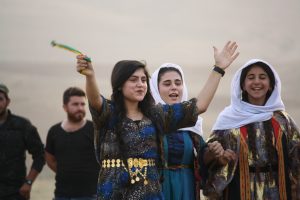After several demonstrations and a two-day march to the border of Basur to go to Kandil, in order to resist the Turkish attacks, people were not allowed to cross the border. Therefore, a solidarity tent was erected on the border of Rojava with Basur in Semalka, north-east of Rojava, to protest against the turkish attacks on Kandil. Initiator of this several-week action was the youth of Rojava.
Since 24th July 2018 next to the border that follows the course of the Dicle, on a large parking lot is a tent surrounded by banners. On the banners there are various messages in Arabic and Kurdish for the Guerrilla in the mountains and the Kurdish Workers’ Party PKK. Surrounded by hills, small villages, checkpoints, trucks and dried-up soil, Semalka Camp has become more than a place of resistance. It also became a place of encounter and collective resistance. Every day many young people, but also older people from various cities and villages Rojavas come to stand together against the attacks against Kandil.

It came the MSD youth from Heseke (Meclisa Syria Democratik – the Syrian Democratic Council) with the YCR (Yekitiya Ciwanen Rojava), also the youth of Deriks. From Qamishli, Til Temer, Sere Kanyi, Til Kocer, Kobane came buses.
The Internationalist Commune was also present together with the youth of the PYD. Very impressive was the fact that young people from seven different Arab places come here, discuss the philosophy of Abdullah Öcalan, the relation to their homeland and about legitimate self-defense. We cook together, organize education on the meaning of homeland and escape, the capitalist north, ethics and culture. We discussed, languages were exchanged, we laughed, danced, we got to know each other, builded connections, made friends.
Behind these weeks there is an impressive organization. Organized groups and individuals, arabs, kurds, turkmen and assyrish youths arriving from the youth centers together in convoys. Every three days the groups alternate. The youth from Raqqa, Deir el Zor and Tapqa drove over 12 hours to stay a few hours in Semalka and sended a militant signal. The workers, who load their trucks here every day on the square around the tent and drive through the country, made a united press statement in solidarity with Kandil.
Each evening, various structures such as TEV-DEM, YPJ / YPG, Kongra Star, Malbata Sehidan (family organization of the fallen), families from the surrounding villages, dancing groups or musicians come here to emphasize the relevance of solidarity with Kandil.

Seen from the outside, a tent that can accommodate a hundred or so people has thousands inside. Here come together those who have been building self-government for years in these confused wars. And those who join this fight. A movement that builds on connecting elements in the contradictions and challenges (of different cultures, religions, ethnic groups and history). A movement that takes the women’s revolution in the first place. Older kurdish women and men who know the revolutionary movement and Abdullah Öcalan come here to strengthen morale and make speeches. Young people who have spent half their lives in war and are confronted at a young age with situations and decisions that are difficult to imagine for many coming from Europe.
The choice to stay in Rojava and the try to survive. The choice to join the islamist gangs or the Syrian state or flee the enticing lie of capitalism of a life in freedom. Or to fight against all this with the revolutionary movement in Rojava. For Democratic Confederalism, for a communal life along the needs of the people living here. For freedom of choice within a social, communal life. For the women’s revolution. For a world beyond state power and violence.

The war leaves deep traces. But there is an organized revolutionary perspective that fights tirelessly for the freedom of all, and has been supporting the population for decades, an indescribable force that has been concentrated in Semalka.